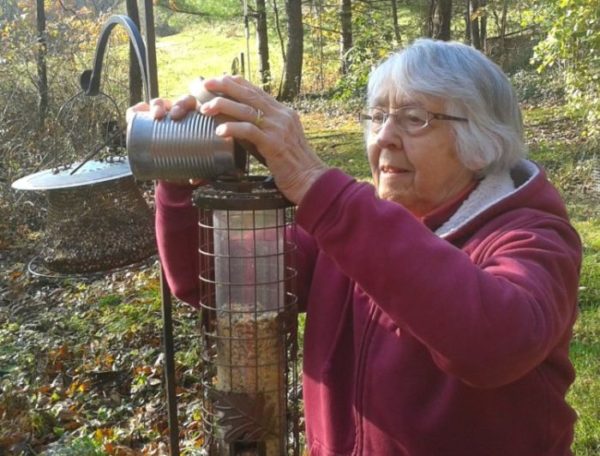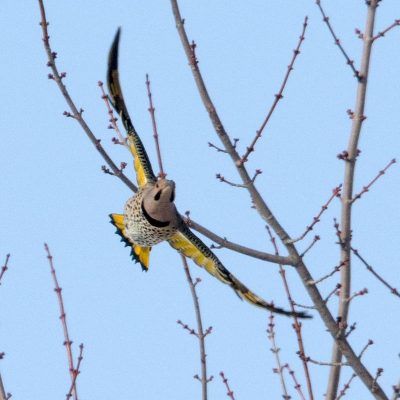
Jocele Meyer finds joy in watching birds. When her family purchased 80 acres near Fresno, Ohio, in 1973, the land had been strip-mined and used as a junkyard. She has made the property her home for over 45 years, and today it is a forested refuge for wildlife.
Later in November, Mennonite Creation Care Network will announce the first recipients of the new Art and Jocele Meyer Award. The award will recognize a congregation and creation care liaison that has done exemplary work on creation care. The award includes a $500 contribution to the congregation’s next green project.
What factors are considered in making the award?
Congregations that have joined MCCN and have a current liaison in regular contact with MCCN are eligible for the award. One award will be given each November if there is a suitable candidate and adequate budget. The award may recognize either long term commitment to caring for the earth or a current project that deserves to be replicated.
Who are Art and Jocele?
Art and Jocele Meyer challenged people of faith to think about the environment long before creation care and eco-justice were buzzwords. The couple is best known for their 1991 book, Earth-keepers: Environmental Perspectives on Hunger, Poverty and Injustice and for their work reclaiming strip-mined land.
Even though Earth-keepers was written nearly 30 years ago, its attention to the links between poverty, environmental degradation and militarism make it feel contemporary. The book draws on the Meyers’ experience working with Mennonite Central Committee on hunger issues as well as Art’s background as a biology teacher. It also presents a distinctly Christian environmental ethic that sees the redemption of Jesus Christ as extending to creation as well as human beings.
A reclaimed piece of land
In 1973, the Meyers purchased 80 acres of land south of Cleveland as a family retreat. Some of the land had been strip-mined in the 1950s and treated like a junkyard. The family embraced the difficult task of restoring the property, and by 1991, they had recycled truckloads of scrap metal and planted 12,000 trees. Art died that year, but Jocele, who is now past 90, has remained on the property ever since. She continues to love the encounters with nature she has there. Watching the birds at her feeder is a favorite activity.
Two sons and a grandson live nearby, making caring for Ohio land an intergenerational commitment. Grandson Chris Meyer says, “I was environmentally and socially aware from a young age, due in large part to their example. Those values completely shaped my worldview and influenced my perspective on what I wanted to pursue in life, not just vocationally, but in my way of living.” He recalls how his grandfather would watch and listen to nature, moving a folding chair around the farm.
According to Jocele, it is this piece of land in Ohio that has sustained her work. “I live in close connection with the creation and the Creator. I realize the earth is the Lord’s and everything in it,” she says. Psalm 24:1 remains one of her favorite verses.
Denominational contributions
Another factor shaping the Meyers’ work was exposure to Christians of other backgrounds through the North American Christian Convention. Hearing how other denominations were responding to environmental concerns sparked them to work on a statement entitled “Stewardship of the Earth: Resolution on Environment and Faith Issues,” which was adopted by the Mennonite Church General Board and General Conference Mennonite Church General Board in 1989. Even at this early date, the statement mentioned climate change.
The resolution called for the creation of the Environmental Task Force. Jocele served on the task force, which functioned until the early 2000s. Working with a handful of other volunteers, the group planned a 1995 Creation Summit which later resulted in the book, Creation and the Environment: An Anabaptist Perspective on a Sustainable World (2000).
“I always appreciated Jocele’s warm words of encouragement as we were starting MCCN,” recalls Luke Gascho, founding leader of MCCN. “I was inspired by her gentle, persistent care for creation and environmental issues. She lived out her commitments in practical simple living ways that were invitational to other people.”
